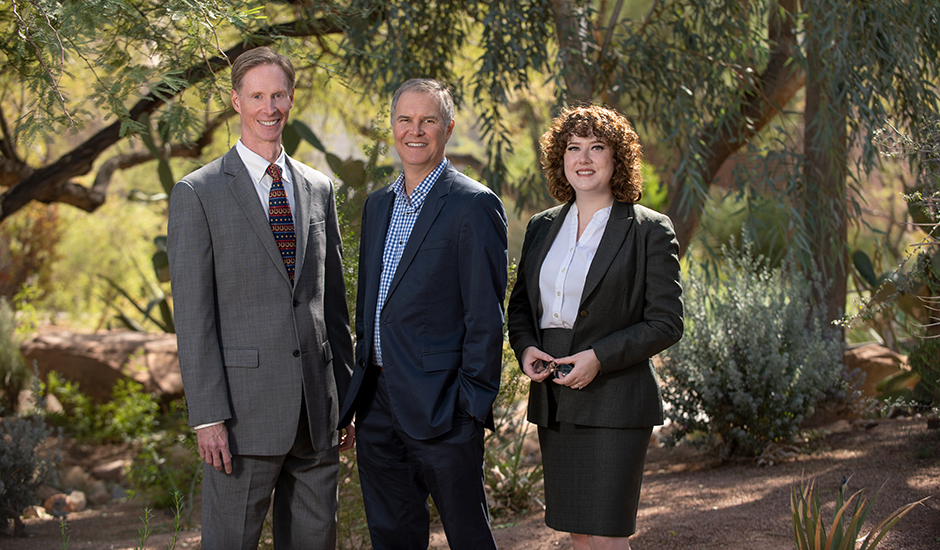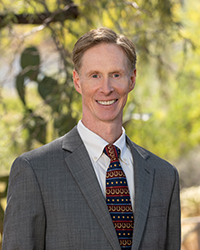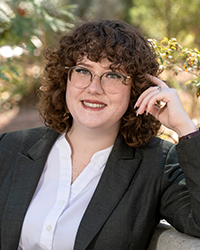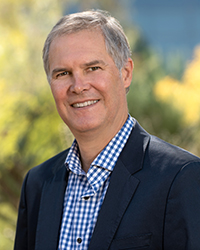Working Toward a Sustainable Future
As our world continues to heat up and dry out, UNLV Boyd Law students and faculty passionately tackle fundamental issues related to environmental law

By Elizabeth Rusiecki
With the passion and dedication of professors and students acting like its renewable energy sources, the UNLV William S. Boyd School of Law is becoming a leader in environmental law. Some inconvenient and convenient truths propelling its rise:
• Las Vegas and Reno are two of the fastest-warming cities in the United States.
• With a climate change-fueled drought sinking Lake Mead to an unprecedented 35 percent capacity, the federal government this summer declared a water shortage on the Colorado River for the first time, triggering mandatory water consumption cuts throughout the Southwest.
• Many UNLV Boyd students were raised on and around the ski slopes, lake shores, and sandstone hiking trails of the Silver State.
• The school’s environmental law program is led by climate veterans who revere the (increasingly scalding) sun and (rapidly disappearing) water as much as the students they mentor.
Settling into a New Environment

A veteran of the Environmental Protection Agency, Fritz had 24 years of Superfund cleanups under his belt before following the sun (and his spouse) to Las Vegas. His wife, Kathy Stanchi, had joined the law school’s faculty as E.L. Cord Professor of Law, and as Fritz approached the end of a government career, a low-energy light bulb went off: He proposed the Climate and Sustainability Law Project, and UNLV Boyd Law welcomed him.
The new guy in town, Fritz went on a conference spree to shake some hands. One of the first people he met was Kristen Averyt, a UNLV research professor who is focusing on climate resilience and urban sustainability. She is also Nevada’s climate policy coordinator. When he called Averyt to volunteer his time, she told him what was needed: professors and law students to do the legal research required to develop the state’s first climate strategy.
Fritz and several members of the UNLV Boyd Law community (including students) dug in, examining legal techniques the state could implement to mitigate climate change. Their research on transportation, electricity, commercial and residential buildings, and land use—and what laws the state could enact or amend to achieve its climate goals—were instrumental in the 2020 Nevada State Climate Strategy.
“It was the most rewarding thing I have done in my entire career,” says Fritz, whose team’s research also included using greater sage grouse habitats to capture carbon. “Working on the climate strategy had the potential to help people in Nevada and, honestly, throughout the world.”
Roadmaps and Footprints
Inspired by the 2019 book Legal Pathways to Deep Decarbonization in the United States—considered a road map for the future of environmental law—Fritz also crafted a law that makes it easier to build hydrogen-fueling stations for hydrogen fuel cell-powered trucks. That law is now one of 2,000 model laws on the nationwide pro bono Legal Pathways to Deep Decarbonization website, which legislatures can customize and adopt to achieve deep reductions in fossil fuel use and greenhouse gas emissions.
Hoping to involve more students in writing laws that address climate change, Fritz began teaching a Climate Law Practicum during the spring 2021 semester. An intimate class of nine, students collaborated much like they would at a law firm. This fall, the practicum picked up where spring students left off, writing a law to mitigate greenhouse gas emissions from buildings. Fritz plans to submit that work to Legal Pathways to Deep Decarbonization as well.
“It’s practical, legal work on climate change, looking across the U.S. for the best example laws and models, and trying to synthesize them into something better,” he says. “It also offers recommendations for taking a slightly different [legal] approach that we think could be better or people should think about.”
Environment: The New Justice
It doesn’t require a telescope to see that environmental concerns have seeped into every corner of business. That’s why Fritz is hopeful that more students and student lawyers are electrified at the thought of working climate strategy into their careers in some way. After all, who better to write laws legislating consumption, output, and public resource use than UNLV Boyd Law alums who studied law in Nevada, where plentiful public lands have been greatly impacted by climate change?
“That’s a thought for the future: How can Boyd help you?” Fritz says. “I would like to use my energy, effort, talent, and the enthusiasm of Boyd students to make our world a better place for our children, grandchildren, nieces and nephews.”
There’s the environmental justice career route, too. Fritz says the law school’s recent work with the Windsor Park community is strong evidence of the power of joint public and private partnerships.
A historic North Las Vegas neighborhood, designed for Black Americans in the 1960s, Windsor Park is literally sinking because of depleted groundwater reservoirs and the community’s placement atop geographic faults. With homes slipping back into the earth and a neighborhood in disrepair, Fritz says Nevada Assemblywoman Dina Neal approached the law school to help illuminate the crisis in her district.
UNLV Boyd Law reached out to Department of Film associate professor Brett Levner, who along with graduate student Jacqueline Olivé and undergraduate film students, interviewed Windsor Park residents in hopes of shining a light on a community that “felt the government had stopped listening.” The resulting documentary, Windsor Park: The Sinking Streets, premiered at UNLV in September.
Warming to Environmental Law

Kuschel says participation in the student organization has doubled, if not tripled from last year. In addition to having genuine concern for the environment, students also understand that they can be at the forefront of shaping a field of law that’s underserved—particularly in the Silver State.
The former chapter secretary, Kuschel notes that Nevada has the largest percentage of federal land in the United States yet lacks a substantial environmental law community, essentially handicapping hands-on opportunities for UNLV Boyd students. So when organizations ask her to pass clerkship opportunities onto students, Kuschel does so eagerly, knowing her organization is creating opportunities for Boyd-harvested lawyers to do important and needed work in Nevada.
For example, during the spring 2021 semester, 11 Environmental Law Society students and four supervisors from the Nevada Environmental Justice Coalition and National Lawyers Guild Las Vegas teamed up on three pro bono research projects: examining equitable public outreach processes, managing Western sprawl, and legislative research into a potential blockchain-based town in the Nevada desert.
“The success we’ve had in just the last year alone is amazing,” Kuschel says. Looking ahead, she anticipates increased visiting speakers, hikes, clean-up opportunities, and potential partnerships with organizations like the Sierra Club Toiyabe Chapter, Progressive Leadership Alliance of Nevada, and Make the Road Nevada. “My hope and my goal, ultimately, is that UNLV becomes known for its environmental law program, and students know if they do go to Boyd, it’s an area they can practice in the long term.”
She lauds the law school’s faculty for their mentorship, and says professors are open and welcoming to any student who displays the initiative and passion to embark on a challenging career.
“This is such a difficult area of law to work in,” says Kuschel, a lifelong Nevadan. “It’s probably the least [financially lucrative], and you have a lot of people who oppose you. Having professors like this around me makes me feel confident in my choice to pursue this area of law.”
Kuschel credits those professors for helping her secure a cherished opportunity: This fall, she was the first UNLV Boyd Law student to work with the Environmental Law Institute, a global think tank based in Washington, D.C.
Water Rights—and Wrongs

It’s the glass-half-empty news that’s spurring the interest: With Lake Mead water levels at an all-time low, the U.S. Bureau of Reclamation in August declared the first water shortage in history. As a result, Southern Nevada and other jurisdictions around the Southwest that rely on Lake Mead for their water supply will be forced to reduce their annual draw beginning in January.
“We have record high enrollment this term,” Birdsong says. “I think what’s bringing them in is the increasing consciousness of climate change and the long-term questions about the sustainability of our resources in the Southwest.”
During the recent fall semester, Birdsong’s Water Law course addressed allocation of water use, with a primary focus on Western law issues. With hotter, drier seasons lasting longer, lower water flows, and less snowpack runoff from the western slope of the Rocky Mountains, the class took direct aim at the Colorado River—the 1,450-mile-long lifeblood of the Southwest.
“We are going to spend a little more time than usual looking at the Colorado River and the complex set of laws that dictate how its water is used,” says Birdsong, who serves as the Environmental Law Society’s faculty adviser. “Many of those things we look at piecemeal. But this year we’re going to look at it in a more integrated way.”
The West’s New Normal
The former Deputy Solicitor for Land Resources at the Department of the Interior during the Obama Administration, Birdsong specializes in federal public lands and conservation law. And he’s the bearer of some bad (but not exactly unexpected) news: Climate models aren’t favorable for the Southwest.
There’s the heat, the drought, and the disappearing biodiversity. That lethal combination means the way we use water—and the legal mechanisms we have to manage it—must change. Still, Birdsong reminds us, there’s never been a lot of water law careers in vulnerable cities like Las Vegas. He hopes to change that.
“Just this summer, fires, floods, water shortage—it’s all around us, and it’s propping up student interest. They want to know more,” he says. “I think of my class as not just preparing people to go out and be water lawyers, but preparing them to understand what it means to live in the West.
“I always tell my students in terms of natural resources and public lands, knowing about those topics—whether or not you ever practice in those areas—makes you a better citizen. It helps you understand why things are the way they are.”
Understanding “why things are the way they are” was precisely the focus of Birdsong’s pre-pandemic Natural Resources Field Seminar, which saw him and a small group of students “jump in a van” for a ground-floor view of environmental issues in the landscape in real time.
“I think about that course almost every day, because there are so many issues we could go and cover,” he says, ticking off highlights of previous trips: examining utility scale solar on Bureau of Land Management land; the attempt by mining company Barrick Gold to mitigate the loss of sage grouse (Nevada’s protected game bird); the legal issues surrounding the creation of the BLM-managed Basin and Range National Monument; visiting with Shoshone land-rights activist Carrie Dann before her death in January.
“It’s nice to go more slowly and take time out on the landscape and understand how the issues play out,” Birdsong says.
A Crisis Heats Up
Paving Nevada over with solar panels isn’t the solution to our climate crisis, Birdsong says. The desert and sagebrush are full of life. The solution, he says, is increased consciousness of the natural resources that not only provide us that cheap Western water and electricity we’ve come to expect, but also support the natural systems and biodiversity essential to sustaining life on our planet.
“We know to adequately respond to climate change we’re going to have to ramp up by like eight times what we’ve done in the past,” Birdsong says. “There’s going to be unbelievable demand to [allocate] more federal land for solar and wind farms. The question I have is: How can we do that in a way that is also going to recognize that we’re not only in a climate crisis, but we’re also in a biodiversity crisis?”
“What people don’t know, and even a lot of Nevadans don’t know, is how precious and unique our resources are.”
Which is where the UNLV Boyd School of Law comes in. With professors like Birdsong and Fritz conducting critical research and tackling key issues in their classes—and with students like Kuschel opting for legal careers that are more personally (rather than financially) rewarding—the law school is at the forefront of addressing a stark reality: Our planet is in peril. And time is something we can’t afford to waste.